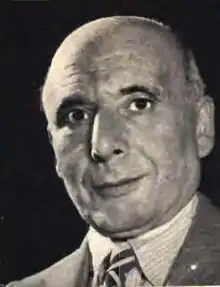Epicarmo Corbino | |
|---|---|
 | |
| Minister of Treasury | |
| In office December 1945 – September 1946 | |
| Prime Minister | Alcide De Gasperi |
| Minister of Industry | |
| In office 1945–1945 | |
| Personal details | |
| Born | 1890 Augusta, Sicily, Kingdom of Italy |
| Died | 1984 (aged 93–94) Naples, Italy |
| Political party | Italian Liberal Party |
| Children | |
| Academic work | |
| Institutions | University of Naples |
Epicarmo Corbino (1890–1984) was an Italian academic and economist who served briefly as the minister of industry and the minister of treasury in the 1940s. He was among the most influential Italian economists.[1]
Biography
Corbino was born in Augusta, Sicily, in 1890.[2] He was the brother of Orso Mario Corbino, a politician served in the cabinets of Mussolini.[3]
Epicarmo Corbino was promoted to professorship at the University of Naples in 1923.[2] He was the minister of industry and commerce in the government of Salerno between 11 February and 17 April 1944.[2] He served as minister of the treasury in the first and second cabinets of Prime Minister Alcide De Gasperi from December 1945 to September 1946 when he resigned from the office.[2][4] Corbino was member of the National Council and then, of the Constituent Assembly until 1953 for the Liberal party.[2]
Carbino left the Liberal Party before the general elections in 1953 and co-founded and headed the National Democratic Alliance in the elections.[5] He collaborated with former Prime Minister Ferruccio Parri in the establishment of the party.[6] However, the party did not manage to win a seat at the parliament.[5]
Between 1959 and 1965 Corbino was the president of the Banco di Napoli.[2] He died in Naples in 1984.[2]
Views and work
As an economist Corbino belonged to the classical school of economics in addition to Marcello Soleri, Pietro Campilli, Luigi Einaudi and Gustavo Del Vecchio.[7][8] He described himself as an advocate of the approach developed by British economist Alfred Marshall.[4] Therefore, he was an ardent supporter of free enterprise.[4] During the Fascist period Corbino and other liberal economists, including Attilio Cabiati, Edoardo Giretti and Luigi Einaudi did not become closer to the regime.[1]
He was author of many books. Later he also published studies of environmental problems, being one of the pioneers in this field in Italy.[9]
References
- 1 2 Maurizio Vaudagna (1978). "Structural Change in Fascist Italy". The Journal of Economic History. 38 (1): 184. doi:10.1017/S0022050700088239. S2CID 154932244.
- 1 2 3 4 5 6 7 "Corbino, Epicarmo" (in Italian). Treccani. Retrieved 27 March 2022.
- ↑ "About Us". Fondazione Cariello Corbino. Retrieved 27 March 2022.
- 1 2 3 Alberto Mingardi (2020). "The Road Not Taken of "Nuovo liberalismo"". In John B. Taylor (ed.). From the Past to the Future: Ideas and Actions for a Free Society. Hoover Press. Archived from the original on 2 December 2021.
- 1 2 MKG (August 1953). "The Italian General Election and Its Consequences". The World Today. 9 (8): 335. JSTOR 40392653.
- ↑ Clifford A. L. Rich (September 1953). "Political Trends in Italy". The Western Political Quarterly. 6 (3): 478. doi:10.2307/442365. JSTOR 442365.
- ↑ Rita Mascolo (2020). "Tennessee valley in Southern Italy: How the ENSI project was the first and only World Bank loan for nuclear power". Business History. 64 (8): 4. doi:10.1080/00076791.2020.1819984. S2CID 225016028.
- ↑ Douglass Charles Day (1982). The Shaping of Postwar Italian Politics: Italy 1945-1948 (PhD thesis). University of Chicago. p. 104. ISBN 979-8-205-08303-4. ProQuest 303267078.
- ↑ Duccio Cavalieri (2010). "Epicarmo Corbino, XXth century liberal neoclassical economist". Il Pensiero Economico Italiano (in Italian). 2 (20).
External links
 Media related to Epicarmo Corbino at Wikimedia Commons
Media related to Epicarmo Corbino at Wikimedia Commons